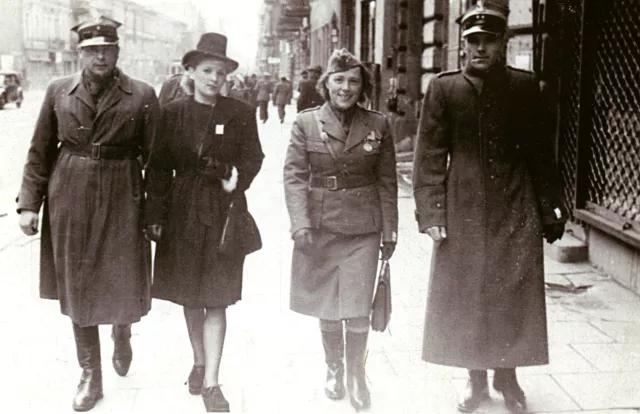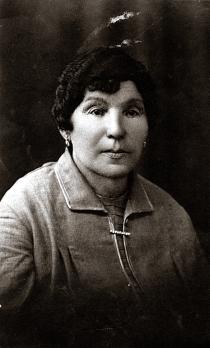Janina Duda with her husband and relatives in Lodz
This photo was taken in Lodz in 1946. It's me, second from right and my husband, Teodor Duda, first from right. We are walking in the street in Lodz with our friends - my cousin Franciszek Bortner with his wife Zosia.
After the war different things happened, but mostly I worked. I kept moving around Poland, following my husband, Teodor Duda. My husband, Teodor Duda, was from a village called Czesniki near Zamosc, from a large family of the Eastern Orthodox faith. He was born in 1914, on 25th November. He himself couldn't say if he was Polish or Ukrainian. Because there was no national consciousness in the countryside yet. He studied, he attended elementary school. They were very poor, because 2 hectares of land for eleven people is not much. There was one pair of shoes for several boys, so they would take turns going to school. The oldest brother, Mieczyslaw, who served in the Polish Army, married rich and he helped my husband very much, so that he could study. Mieczyslaw lived in Komorow, a village near Zamosc.
When he was 17, Teodor got involved with the Communist Union of Polish Youth, he was sentenced to three years in jail. And he spent those three years in jail. When he came back, he was, as it was said - a professional communist activist. He was sent to prison again, this time for eight years and he got out during the war, in 1939. He went to the Soviet Union and he happily approached the border patrol, telling them that he, a communist, was going to his, how would you put it, spiritual homeland. So they sent him to a labor camp for three years. He was somewhere up in the Ural, then they settled him in Kazakhstan, he found his way to the army from there, but not to Anders, to Berling, to the 1st Kosciuszko Infantry Division.
So this is how we met in the Polish partisan headquarters, I had been in the Soviet partisan forces, I was staff officer of the Grunwald brigade, which was supposed to cross the River Bug. And this is how the two of us got together. After the war, he was an officer, a senior officer of the ministry of defense. We got married officially in 1946. What do I think of him? I have to say that when I look at the people around us, I think - God, if there were only more idealistic people like him, then all changes would happen differently. Apart from his ideology, he was a very decent man, very kind and that was probably the greatest luck I had in life. We spent 42 years together.
My husband wasn't nationalistic at all. For him, everyone was a human being first. I even have to say that at first he would brag to his friends about having a Jewish wife. I told him: 'Fiedia - this is how we called him in Russian - stop it, you never know who you're dealing with.' I simply pointed it out to him that he shouldn't trust everyone like that. Anyway, I think I couldn't have had it better than with him. Such was my happiness. But we didn't have children. I was pregnant, but I had to terminate: it wasn't a time for having babies in 1941. I walked from Vysotsk to Stolin, had the procedure and went back on foot, 30 kilometers. I fell ill and somehow? I couldn't have children later.






















